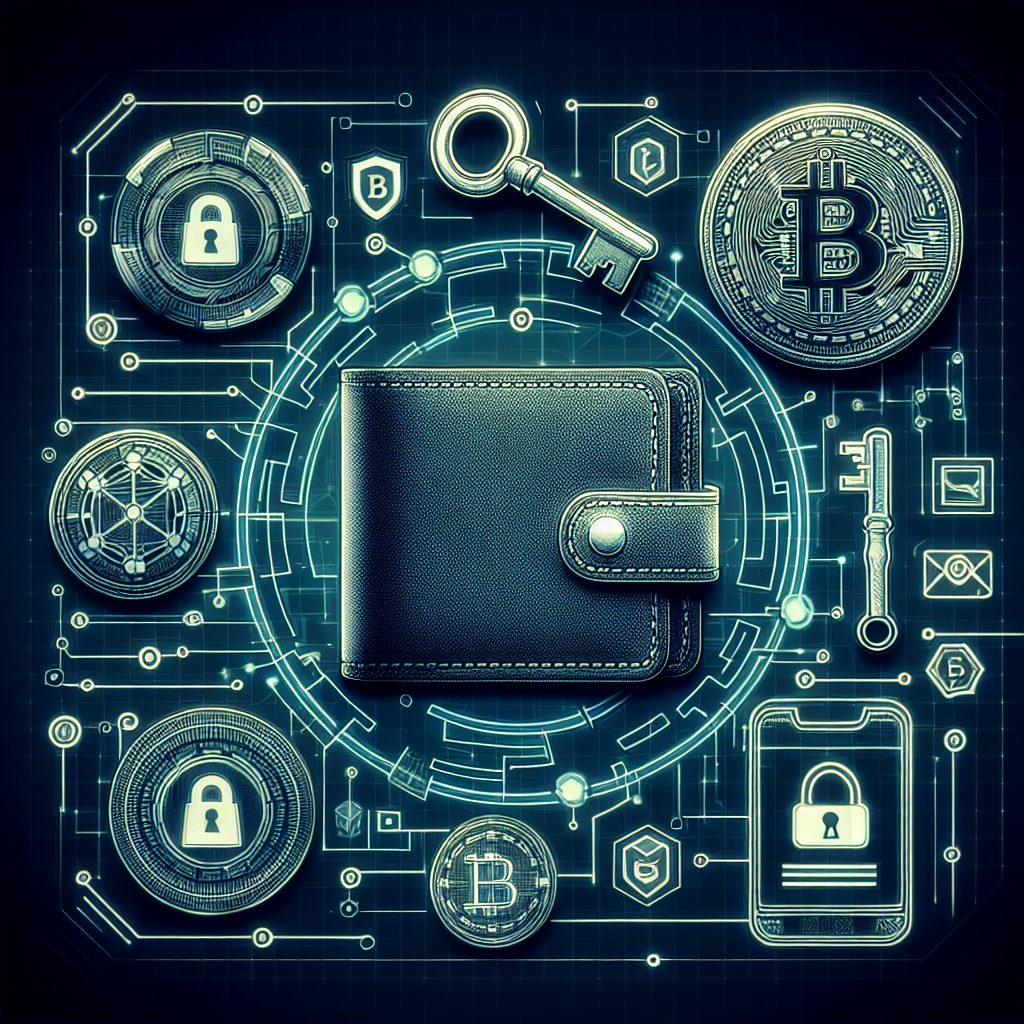In today’s digital age, cryptocurrencies have become a popular form of investment and transaction. But with increasing cybersecurity threats, it is crucial to understand how to perform secure cryptocurrency transactions. This article will guide you through the necessary steps and precautions to ensure your transactions are safe and protected from potential cyber attacks. From choosing a secure wallet to implementing strong authentication measures, you will gain valuable insights into safeguarding your cryptocurrency transactions and keeping your assets secure.
Choosing a Secure Cryptocurrency Wallet
Types of cryptocurrency wallets
When choosing a secure cryptocurrency wallet, it’s important to understand the types of wallets available. There are two main categories: hot wallets and cold wallets.
Hot wallets are connected to the internet and are more susceptible to hacking attempts. They include online wallets that are stored on exchanges or web-based platforms, as well as mobile wallets that are installed on smartphones.
On the other hand, cold wallets are offline and provide a higher level of security. They come in the form of hardware wallets, which are physical devices that store your private keys offline, or paper wallets, which are physical printouts of your private keys.
Offline vs online wallets
While online wallets offer convenience and ease of use, they pose a higher risk of being hacked. This is because they require an internet connection to access your funds, making them vulnerable to cyber attacks. In contrast, offline wallets, such as hardware wallets, store your private keys in a secure offline environment, reducing the risk of hacking.
It’s important to strike a balance between convenience and security when choosing a cryptocurrency wallet. If you frequently make transactions, an online wallet may be more suitable. However, if security is your top priority, opting for an offline wallet is highly recommended.
Private keys and recovery phrases
Private keys are crucial for accessing and managing your cryptocurrency. They are essentially your passwords to your wallet, allowing you to send and receive funds. It is essential to keep your private keys secure and confidential, as they grant control over your funds.
In addition, it’s important to have a recovery phrase, also known as a seed phrase or backup phrase. This is a series of words that can be used to recover your wallet if you lose access to your private keys. It is vital to store your recovery phrase in a safe and secure location, preferably offline.
Securing Your Private Keys
Understanding private keys
Private keys are the cornerstone of cryptocurrency security. They are generated when you create a new wallet and are mathematically linked to your public address. Private keys should never be shared with anyone, as doing so would grant them access to your funds.
It is important to understand how private keys are generated and stored. Most wallets use random number generation algorithms to create unique private keys. These keys are then encrypted and stored securely within your wallet. By understanding this process, you can better protect your private keys from unauthorized access.
Creating a strong password
A strong password is essential for securing your wallet and protecting your private keys. When creating a password, make sure to use a combination of uppercase and lowercase letters, numbers, and special characters. Avoid using easily guessable passwords, such as common words or personal information.
It is also recommended to use a long password, as longer passwords are more secure. Consider using a password manager to generate and store strong, unique passwords for your cryptocurrency wallets.
Using hardware wallets
Hardware wallets offer an additional layer of security for your private keys. These physical devices store your private keys offline, reducing the risk of hacking. Hardware wallets are designed to be resistant to malware and phishing attacks, making them one of the most secure options for storing cryptocurrencies.
When using a hardware wallet, make sure to purchase it directly from the manufacturer or authorized resellers. Do not buy used hardware wallets, as they may have been tampered with or compromised.
Multisignature wallets
Multisignature wallets require multiple signatures or approvals to authorize a transaction. This adds an extra layer of security, as it prevents a single entity or individual from having full control over the funds. With multisignature wallets, several private key holders must approve a transaction before it can be executed.
Using multisignature wallets can help protect against unauthorized transactions and reduce the risk of funds being stolen. Consider using a multisignature wallet, especially if you are dealing with large amounts of cryptocurrency.

Verifying Transaction Addresses
Ensuring accuracy of input addresses
One of the most common mistakes in cryptocurrency transactions is entering the wrong recipient address. This can lead to irreversible loss of funds. To avoid this, it is important to double-check and verify the accuracy of the input addresses before confirming a transaction.
Take the time to carefully copy and paste the recipient’s address or use a QR code scanner to minimize the chances of making errors. Always verify the first and last few characters of the address to ensure you are sending funds to the correct destination.
Using unique addresses for each transaction
To enhance your transaction security, it is recommended to use unique addresses for each transaction. Reusing addresses can compromise your privacy and make it easier for others to track your transactions. By generating a new address for each transaction, you add an extra layer of anonymity and protect your financial privacy.
Most wallets allow you to generate new addresses on-demand, or you can use a hierarchical deterministic (HD) wallet that automatically generates new addresses for each transaction. Ensure your wallet supports this feature and make it a habit to use new addresses for every transaction.
Verifying addresses with multiple sources
Before sending funds to a specific address, it is wise to cross-verify the address from multiple trusted sources. One way to do this is to use block explorer websites, which allow you to check the transaction history associated with a particular address. By confirming the address on multiple sources, you can ensure that it is legitimate and mitigate the risk of falling victim to scams or phishing attempts.
Using Two-Factor Authentication
Importance of two-factor authentication
Two-factor authentication (2FA) adds an extra layer of security to your cryptocurrency accounts. It requires you to provide a second form of verification, usually a unique code generated by an authentication app, in addition to your password. This significantly reduces the risk of unauthorized access, even if your password is compromised.
2FA is particularly crucial for cryptocurrency exchanges and wallets, as they are prime targets for hackers. Enabling 2FA adds an additional barrier that must be overcome before anyone can gain access to your funds.
Choosing a reliable authentication method
When setting up 2FA, it is important to choose a reliable authentication method. Avoid using SMS-based 2FA, as it can be vulnerable to SIM swapping attacks. Instead, opt for app-based authenticators, such as Google Authenticator or Authy, which generate unique codes on your smartphone.
Ensure that you have a backup method in place in case you lose access to your primary 2FA device. Most authenticator apps provide backup codes or support the ability to transfer 2FA to a new device. Keep these backup codes or recovery options in a safe and secure location.
Enabling 2FA for cryptocurrency exchanges and wallets
To strengthen the security of your cryptocurrency exchanges and wallets, enable 2FA wherever possible. Most reputable exchanges and wallet providers offer 2FA as a security measure. Take the time to set it up and ensure that it’s properly configured to maximize the protection of your funds.
Remember to regularly review and update your 2FA settings, especially if you change devices or suspect any compromise of your security measures.

Encrypting Your Wallet and Backing Up Data
Importance of wallet encryption
Wallet encryption adds an additional layer of protection to your cryptocurrency funds. By encrypting your wallet, you ensure that even if your device or wallet files are compromised, the attacker would need the encryption passphrase to decrypt and access your funds. Wallet encryption is especially crucial for mobile wallets and computer-based wallets.
During the wallet creation process, make sure to enable encryption and choose a strong passphrase. Avoid using common phrases or passwords that can be easily guessed. Ideally, your encryption passphrase should be different from your wallet password or any other passwords you use.
Backing up wallet files
Backing up your wallet files is essential in case of device loss, theft, or hardware failure. Without a backup, you risk permanently losing access to your funds. Most wallets provide an option to back up your wallet files, either through a backup feature within the wallet software or by manually copying the wallet files to an external storage device.
When creating backup files, store them securely and offline, preferably in multiple locations for redundancy. Consider using encrypted external storage devices, such as USB drives, and keep them in a safe and secure place away from prying eyes.
Using secure storage options
When it comes to storing your encrypted wallet files and backups, it’s important to choose secure storage options. Avoid storing them on your computer’s hard drive, as it can be vulnerable to malware or hardware failures. Instead, consider using encrypted cloud storage services or dedicated hardware devices designed for secure storage.
Always be cautious of where and how you store your sensitive wallet information. Protect it from physical and digital threats to ensure the safety of your cryptocurrency funds.
Secure Internet and Device Usage
Avoiding public Wi-Fi networks
Public Wi-Fi networks are inherently insecure and can expose your device and data to malicious actors. When performing cryptocurrency transactions, it is crucial to avoid using public Wi-Fi networks, as they can be easily intercepted by hackers.
Instead, opt for secured and private networks, such as your home network or a trusted cellular data connection. If you must connect to a public Wi-Fi network, use a virtual private network (VPN) to encrypt your internet traffic and protect your data.
Using secure and updated devices
Using secure and updated devices is essential to protect your cryptocurrency activities. Ensure that your devices have the latest software updates installed, including operating system updates, security patches, and antivirus software updates.
Regularly scan your devices for malware and keep an eye out for suspicious activities. Be cautious of downloading and installing apps or software from untrusted sources, as they may contain malicious code that can compromise your device’s security.
Installing reputable antivirus software
Antivirus software plays a crucial role in protecting your devices from malware and other security threats. Install reputable antivirus software and keep it up to date to ensure continuous protection.
It’s important to choose antivirus software from trusted and well-known providers. Regularly perform antivirus scans on your devices and follow any recommendations or alerts provided by the software to maintain a secure environment for your cryptocurrency transactions.
Conducting Due Diligence on Exchanges
Researching exchange reputation
Before using a cryptocurrency exchange, it is vital to research and evaluate its reputation. Look for user reviews, feedback, and ratings from reputable sources. Consider the exchange’s history, security incidents, and overall customer satisfaction.
Pay attention to how the exchange handles security breaches, if any, and the steps they have taken to improve their security measures. A reputable and trustworthy exchange will prioritize the security of its users’ funds.
Verifying regulatory compliance
Cryptocurrency exchanges that comply with relevant regulations and have obtained the necessary licenses provide an added layer of security. Regulatory compliance indicates that the exchange adheres to specific guidelines and undergoes regular audits, which can boost user confidence in the platform’s security practices.
Research the regulatory landscape of the exchange’s jurisdiction and verify if the exchange has obtained the required licenses and registrations. Additionally, check if the exchange follows know-your-customer (KYC) and anti-money laundering (AML) procedures to ensure a higher level of security and trust.
Considering exchange security measures
Evaluate the security measures implemented by the cryptocurrency exchange. Look for features such as cold storage for funds, multi-factor authentication, withdrawal confirmation processes, and transaction monitoring systems. These security measures demonstrate the exchange’s commitment to safeguarding users’ funds.
Pay attention to whether the exchange has experienced security incidents in the past and how they have addressed and improved their security measures since then. Choosing an exchange with robust security practices can significantly reduce the risk of funds being compromised.
Understanding Transaction Fees and Confirmation Times
Factors affecting transaction fees
Transaction fees in cryptocurrencies are determined by several factors, including network congestion, transaction size, and the level of priority set for the transaction. During times of high demand, network congestion can cause transaction fees to increase. Larger transactions also typically incur higher fees due to their larger data size.
It is important to consider these factors when conducting cryptocurrency transactions, especially during times of increased network activity, to avoid overpaying for transaction fees.
Choosing appropriate fee levels
When determining the appropriate fee level for your cryptocurrency transactions, it’s essential to consider both the urgency of the transaction and the prevailing network conditions.
If you require faster confirmations, you may need to set a higher fee to incentivize miners to prioritize your transaction. However, if time is not an issue, setting a lower fee can help reduce transaction costs.
Many wallets and exchanges provide fee estimation tools that calculate the appropriate fee based on the current network conditions. Utilize these tools to choose an appropriate fee level and ensure timely confirmation of your transactions.
Waiting for confirmations before considering transactions final
Cryptocurrency transactions are not considered final or fully secure until they are confirmed by the network. The confirmation process involves miners including the transaction in a new block and adding it to the blockchain.
It is important to wait for a sufficient number of confirmations, depending on the cryptocurrency being used, before considering a transaction as final. Each confirmation increases the level of security, as it provides more proof that the transaction is valid and has been accepted by the network.
Waiting for confirmations helps prevent double-spending and ensures the integrity of your cryptocurrency transactions.
Avoiding Phishing and Scam Attempts
Recognizing phishing emails and websites
Phishing attempts are prevalent in the cryptocurrency space, with scammers using various techniques to trick users into revealing their login credentials or private keys. Phishing emails and websites often mimic legitimate platforms, making it difficult to differentiate between real and fake communications.
Protect yourself by being vigilant and ensuring that all communications, especially those requesting personal information or private keys, are from trusted sources. Check the sender’s email address, verify the website’s URL, and be cautious of unsolicited emails or messages that seem urgent or too good to be true.
Double-checking URLs and domain names
Always double-check the URL and domain name of the websites you visit, especially when entering sensitive information. Phishing websites often use URLs that resemble legitimate ones to deceive users. Look for small discrepancies or misspellings in the URL, as these are common indicators of phishing attempts.
Avoid clicking on links from unknown sources and instead manually type in the website address or use bookmarks from trusted sources to access cryptocurrency exchanges or wallet platforms.
Being cautious of unsolicited offers
Be cautious of unsolicited offers or deals related to cryptocurrencies, as they are often used by scammers to deceive unsuspecting users. If an offer seems too good to be true, it most likely is.
Avoid sharing your personal or financial information with unknown individuals or platforms, especially if they promise guaranteed returns or investment opportunities. Research and verify the legitimacy of any offers before taking any action, and consult reputable sources or financial advisors regarding potential investments.
Keeping Your Activities Private
Using privacy-focused cryptocurrencies
Privacy-focused cryptocurrencies prioritize the anonymity and privacy of transactions. These cryptocurrencies utilize advanced cryptographic techniques to obfuscate transaction details, making it difficult to trace or link transactions to specific individuals.
If privacy is a concern, consider using privacy-focused cryptocurrencies such as Monero (XMR) or Zcash (ZEC). These cryptocurrencies employ technologies like ring signatures and zero-knowledge proofs to enhance confidentiality and protect your financial privacy.
Merging inputs to hide transaction details
Merging inputs is a technique that combines multiple cryptocurrency inputs into a single transaction, making it harder for outside observers to identify the individual transactions. By merging inputs, you can enhance your privacy and reduce the trail of transaction details associated with your wallet.
However, it’s important to note that merging inputs can incur higher transaction fees and may require additional technical knowledge to execute properly. Research and follow best practices when using this technique to ensure the desired level of privacy.
Using Tor and VPNs for anonymity
Tor (The Onion Router) and virtual private networks (VPNs) can help enhance your anonymity when conducting cryptocurrency transactions. Tor routes your internet traffic through a decentralized network of volunteer-operated servers, while VPNs encrypt your internet connection and disguise your IP address.
Using Tor or a VPN can help obfuscate your online activities and make it harder for third parties to track your transactions. However, it’s important to keep in mind that while these tools can enhance your privacy, they are not foolproof and should be used in conjunction with other security measures.
By following these guidelines and implementing the suggested security measures, you can significantly enhance the security of your cryptocurrency transactions. Remember to stay informed about the latest security practices and take proactive steps to protect your assets. Being vigilant and cautious will help safeguard your funds and ensure peace of mind in the exciting world of cryptocurrencies.

